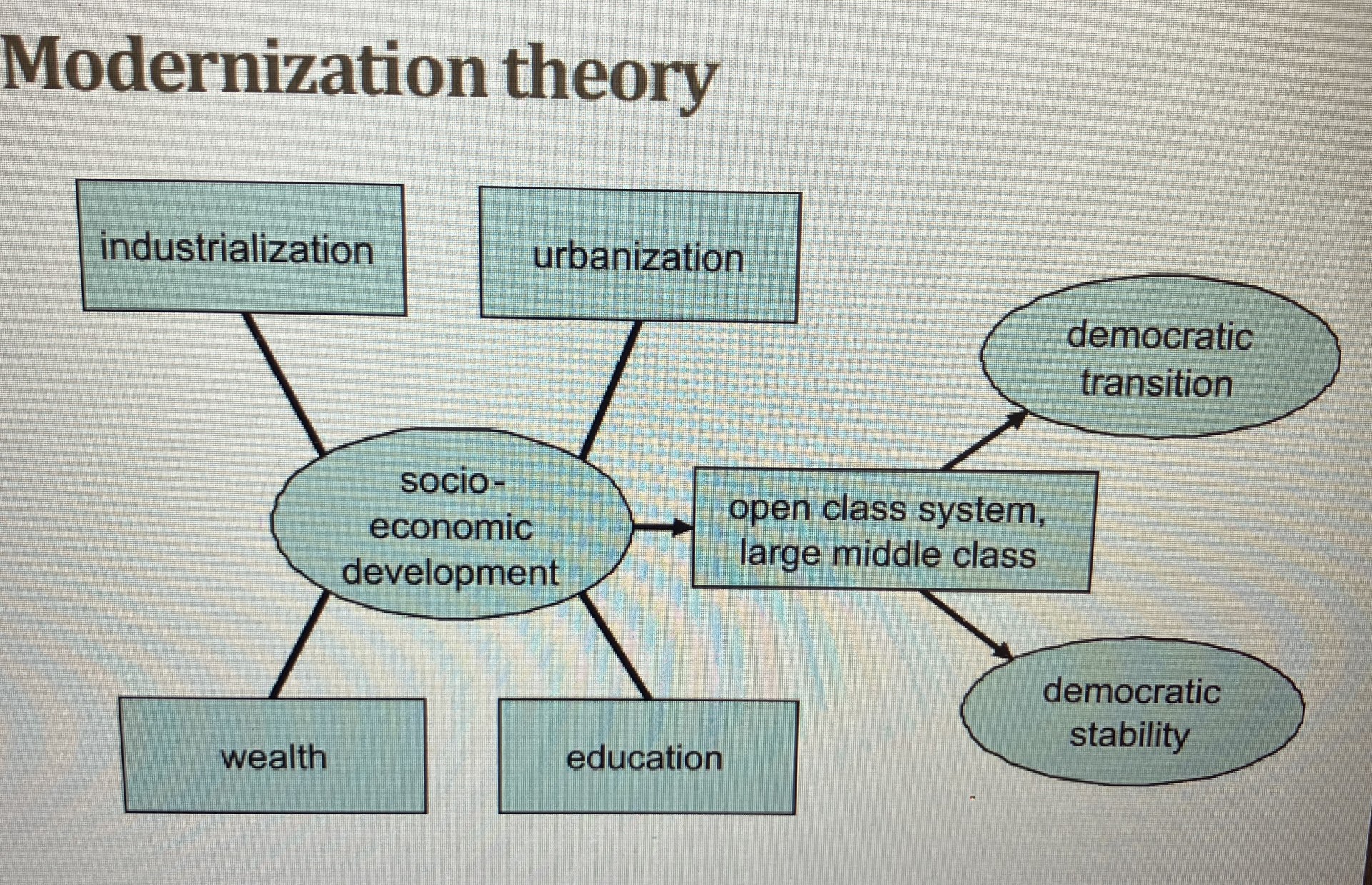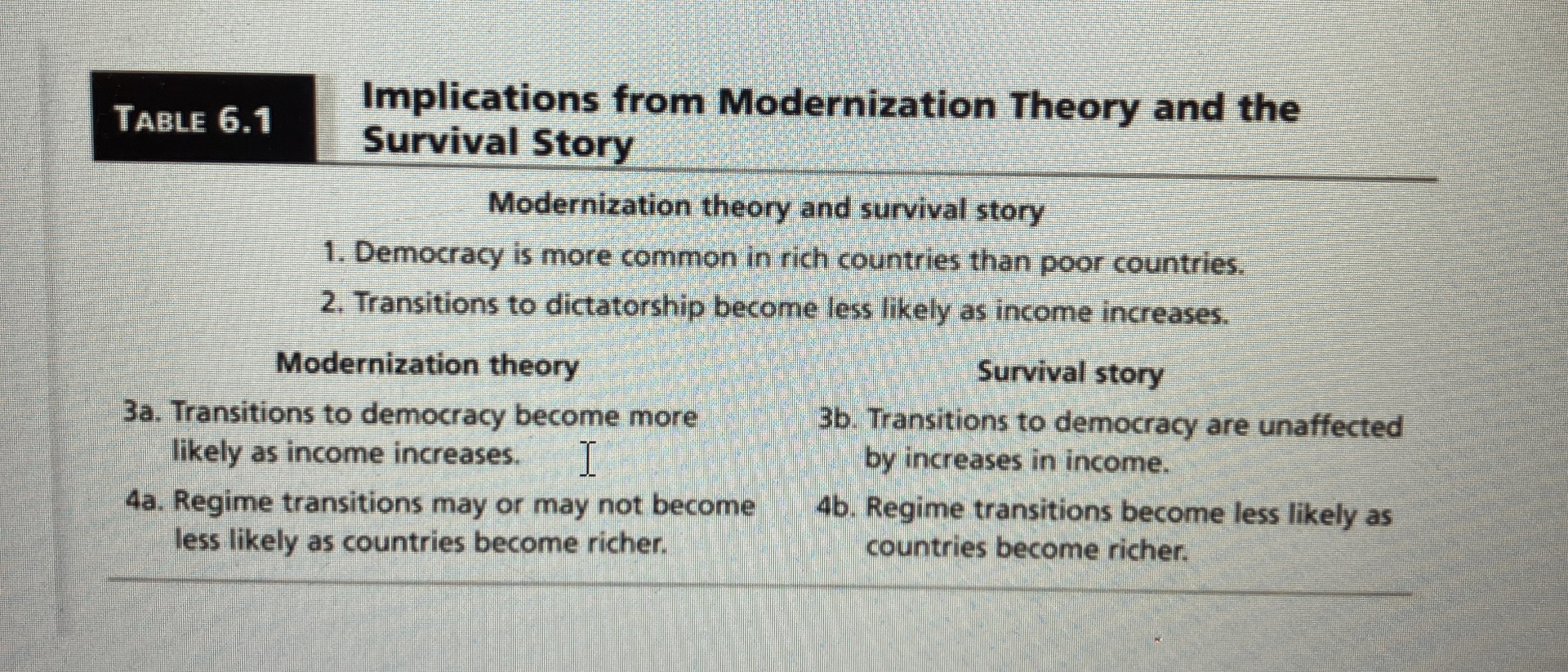Week 2: Democracy and Factors of Democratization
1/25
There's no tags or description
Looks like no tags are added yet.
Name | Mastery | Learn | Test | Matching | Spaced | Call with Kai |
|---|
No analytics yet
Send a link to your students to track their progress
26 Terms
Minimalist democracy (electoral, procedural)
focus on the procedure of elections - free, fair and competitive multi-party elections at regular intervals for determining the head of government and the
legislative branch
Maximalist democracy (liberal, substantive)
• rights and civil liberties
• strong rule of law
• an independent judiciary
• effective checks and balances on the executive power
How to Define Democracy?
Free Fair elections and peaceful transition of power. We should not know about the outcome we need to be uncertain. There needs to be competition.
Rule of the majority, or more precisely, constantly changing
coalitions of the majority
Why won't there be a tyranny of the majority?
The ruling majority today should not violate the rights of
minorities, because tomorrow it may be in the minority
The minority today will have incentives to participate in
competition (e.g., elections, lobbying), because tomorrow it may
become the majority
Modernization and democracy
• “The more well-to-do a nation, the greater the chances that
it will sustain democracy” (Lipset 1959, Some Social
Requisites of Democracy, p. 75).
• Democracy is more common in rich countries than in poor
countries
• Transitions to dictatorship become less likely as wealth
increases
• The importance of the middle class as a necessary condition:
“No bourgeoisie, no democracy" (Moore 1966).
• Empirical studies in disagreement: is there really a causal
relationship between development and democracy?

Survival Story
• Does development bring about democracy?
• Does development sustain already established
democracies?
• Wealth increases survival of democracy, but does not affect
emergence of democracy (Przeworski et al. 2000)
• Under democracy the wealthy are afraid to be left out of a
small wealthy circle under dictatorship ->support democracy
• Under democracy the poor are already poor and have nothing
to lose ->will gamble for autocracy
Modernization Theory and Survival Story

Democracy emergence or survival?
• Empirical evidence shows that countries are more likely to
emerge and survive as they become wealthier
• BUT WHY?
Critique
• Linear (what about Middle East? Weimar
Republic? India?)
• Correlation is not causation!
• Fail to differentiate between transition to
democracy and survival of democracy
• Fail to take into account other explanations
• Fail to take into account elite choices
The resource curse and democracy
• Explains many exceptions to Modernization Theory
• Focuses on the relationship between natural resource wealth
(such as oil, gas, minerals) and political regime type.
• Rentier state theory: Leaders controlling large natural
resource wealth can operate autonomously from societal
interests and are more likely to be autocratic.
1. Rent availability: Authoritarian leaders with readily
available resource revenue can use it for both repression
and cooptation.
2. Taxation: Since leaders are not dependent on tax money
from citizens, they can deny representation and ignore
political demands.
3. Class structure: Natural resources usually prevent
economic diversification and the formation of a large
middle class who can demand democratization.
4. Exit options: Since natural resources are not mobile, if
leaders give up power they will not be able to take these
assets with them.
Culture and democracy
• The idea that democracy is a culture emerging from
historical, religious, and philosophical foundations.
• Two general hypotheses:
1. Democracy is more common in some cultures (for
example, western cultures) – which support democratic
values such as individual liberty, freedom of expression,
equality – than in others (for example, Islam,
Confucianism).
2. Economic development does not directly cause
democracy, but rather economic development leads to
cultural change and the emergence of a civic culture,
which in turn leads to democracy.
• Is every culture conducive to democracy?
Culture as a Barrier to Democracy
- God’s word cannot be disputed -> Catholicism incompatible with democracy
- Protestantism is more receptive to democracy than Islam, due to “the in hospital nature of Islamic culture and society to Western liberal concepts.”
- also argued that Confucianism contradicts with the main tenants of democracy,
since it emphasizes “group over the individual, authority over liberty, and responsibilities over rights”.
Religious explanations: critique
• Religion is evolving
• Religion is subject to different interpretations
• Each religion has democratic elements
Confucian
• Authority
• Common values
• Meritocracy
• Education
• Tolerance
• Limited government
• Protest culture
Islam
• Political violence
• Conflation of religion and law (who enforces law then)
• Gender inequality
• Shura (consultation): even the messenger of Allah should consult with its people in earthly matters
Protestantism: causal paths?
• Protestantism -> economic development ->
Bourgeois-> democracy (M. Weber)
OR?
• Protestantism -> mass education (missioners) ->
democracy (Woodberry, 2004)
OR
• Protestantism was chosen by the most active
and successful?
• Self-selection bias!
Empirical Evidence
• Religion fails to explain democracy
• There are/were democratic countries with a Muslim majority e.g.,
Albania, Bangladesh, Indonesia, Senegal and Turkey
• Correlation changes over time (Catholic countries are democratic)
• Civic culture has more explanatory power
Culture as a Sustainer of Democracy
• Almond and Verba (1963) - Civic Culture
1. A belief that individuals can influence political decisions
2. High support for the existing political system
3. High levels of interpersonal trust
4. Preference for gradual societal change.
Inglehart-Welzel cultural map
• Traditional values emphasize the importance of religion, parent-child ties,
deference to authority and traditional family values. People who embrace
these values also reject divorce, abortion, euthanasia and suicide. These
societies have high levels of national pride and a nationalistic outlook.
• Secular-rational values have the opposite preferences to the traditional
values. These societies place less emphasis on religion, traditional family
values and authority. Divorce, abortion, euthanasia and suicide are seen as
relatively acceptable. (Suicide is not necessarily more common.)
• Survival values place emphasis on economic and physical security. It is
linked with a relatively ethnocentric outlook and low levels of trust and
tolerance.
• Self-expression values give high priority to environmental protection,
growing tolerance of foreigners, gays and lesbians and gender equality, and
rising demands for participation in decision-making in economic and
political life.
Social capital
• Robert Putnam, 1993 «Making Democracy
Work»
• Social capital –> social trust (measured as
participation in social organizations) ->
«good/efficient governance»
• 1970 – 15 regional governments in Italy
• Northern regions – high level of social capital,
Southern - low
Bowling alone?
• «Between 1980 and 1993 the total number of
bowlers in America increased by 10 percent,
while league bowling decreased by 40 percent.»
Critique of Cultural Modernization
• “Modernization leads to and sustains democracy
but only because it changes cultural values and
beliefs, not because of the rise in wealth per se.”
• Deterministic
• Fails to offer a specific mechanism how exactly a
society goes from being authoritarian to being
democratic
• Linear (modernization is not Westernization)
Strategic bargain and democracy
• Democracy as a solution to a credible commitment
problem.
• Credible commitment problem - when one promises smth,
but there is no way to check whether she will keep the
promise
• The latter arises when:
✓An actor who makes a promise today may have an incentive to
renege on that promise in the future
✓Power is in the hands of the actor who makes the promise and
not in the hands of those expected to benefit from the
promise. Clark et al. (2012, p.187)
Modernization -> from agriculture to wool production ->
mobile assets (you can’t hide fields, but you can hide
sheep!) -> production owners can escape taxes
• The Crown needs to borrow resources (e.g., taxes) from
gentry (e.g., to fund wars)
• The Crown fails to credibly commit to pay back (how do we
know?)
• Gentry demands stronger parliament vis-à-vis the Crown
that will make sure the Crown keeps its promises -> birth of
democracy
• When authoritarian elites have to bargain:
1.High level of wealth inequality -> people demand wealth
redistribution
• But! Elites will fight to retain autocracy if demands from the
masses are too high– e.g., Argentina
2.When they fear revolution
• But! Timing of the bargain (Tunisia)
3.When the cost of repression is too high
(Acemoglu and Robinson, 2006)
Critique of Strategic Bargaining
• Too much emphasis on economic inequality – what about
cultural factors?
• Strategic bargaining might help democratize, but in order to
sustain democracy in the long run other factors might be
important (post-modernist values; Russia in 1990s and 2000s)
• Interesting theory by D. Treisman – “Democracy by mistake”
(Gorbachev’s reforms; Romanian leader Nicolae Ceausescu)
• Democratize does not mean being democracy forever – third
wave of authocratization; democratic backsliding...
Type of Colonialism
• The famous argument by Acemoglu, Johnson, and Robinson
(AJR)
• European settlers created very different institutions in their
colonies that explain subsequent economic development
• Countries with tropical diseases (Europeans were not immune to
them -> death) -> Europeans colonized them, did not settle there
and created extractive autocratic institutions - > poor
development
• Congo, Nigeria, Brazil, Mexico
• Countries without diseases -> Europeans settled there
themselves and copied democratic institutions from home
• United States, Canada, Australia, New Zealand
Democracy by Mistake
• Studied 201 democratization cases, 1800-2015
• About 65% of leaders led their country to democracy by trying
to avoid it
• Gorbachev?
• Were they rational?
How Democracies Die
• Gradually, not overnight (Levitsky and Ziblatt, 2018)
• Democracy is undermined by democratically elected leaders
(elections)
• Erdogan, Orban, Chavez? Trump?
• 1973-1985 – 45% - executive takeovers, 23% - military coups
• Since 2000s – 80% - executive takeovers
• Why?
• Polarization of society? (Many works by Svolik; Arbatli and
Rosenberg, 2020)